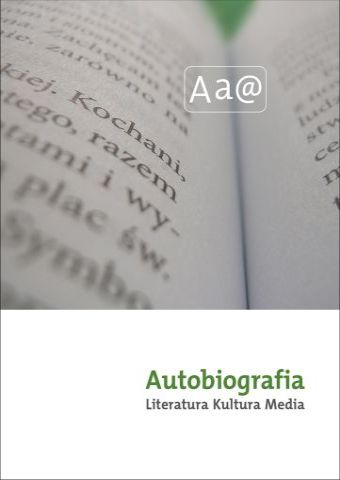






| Autorzy: |
MARTA
WIĘCKIEWICZ-ARCHACKA

Uniwersytet Warmińsko-Mazurski w Olsztynie |
| Słowa kluczowe: | praktyki autobiograficzne zwrot efemeryczny media społecznościowe blog internet strona domowa |
| Data publikacji całości: | 2021 |
| Liczba stron: | 13 (167-179) |
| 1. | Carroll, Traci. „Want Ads: Reading the Personals”. W: Getting a Life: Everyday Uses of Autobiogra¬phy, red. Sidonie Smith, Julia Watson, 156–173. Minneapolis–London: University of Minne¬sota Press, 1996. |
| 2. | Chandler, Daniel, Dilwyn Roberts-Young. The Construction of Identity in the Personal Homepa¬ges of Adolescents. Dostęp 25.01.2021. http://visual-memory.co.uk/daniel/Documents/short/ strasbourg.html. |
| 3. | Cheung, Chi Wai. „A Home on the Web: Presentations of Self on Personal Homepages”. W: Web Studies: Rewiring Media Studies for the Digital Age, red. David Gauntlett, 43–51. London: Arnold, 2000. |
| 4. | Doctorow, Cory, Rael Dornfest, J. Scott Johnson, Shelley Powers, Benjamin Trott, Mena G. Trott. Essential Blogging: Selecting and Using Weblog Tools. Beijing: O’Reilly, 2002. |
| 5. | Elwood, Sarah, Katharyne Mitchell. „Technology, Memory, and Collective Knowing”. Cultural Geographies 22 (2015), 1: 147–154. |
| 6. | Haber, Benjamin. „The Digital Ephemeral Turn: Queer Theory, Privacy, and the Temporality of Risk”. Media, Culture & Society 41 (2019), 8: 1069–1087. |
| 7. | Hijmans, Ellen, Martine van Selm. „Between Altruism and Narcissism: an Action Theoretical Approach of Personal Homepages Devoted to Existential Meaning”. Communications 27 (2002), 1: 103–125. |
| 8. | Ignacio, Siles. „The Rise of Blogging: Articulation as a Dynamic of Technological Stabilization”. New Media & Society 14 (2011), 5: 781–797. |
| 9. | Köhl, Margarita Marie, Gerit Götzenbrucker. „Networked Technologies as Emotional Resources? Exploring Emerging Emotional Cultures on Social Network Sites Such as Facebook and Hi5: a Trans-Cultural Study”. Media, Culture & Society 36 (2014), 4: 508–525. |
| 10. | Lash, Scott. Critique of Information. London–Thousand Oaks–New Delhi: SAGE, 2002. |
| 11. | Michelson, Elana. „Autobiography and Selfhood in the Practice of Adult Learning”. Adult Educa¬tion Quarterly 61 (2010), 1: 3–21. |
| 12. | Miller, Nod, David Morgan. „Called to Account: The CV as an Autobiographical Practice”. Socio¬logy 27 (1993), 1: 133–143. |
| 13. | O’Reilly, Tim. What Is Web 2.0. Design Patterns and Business Models for the Next Generation of Software. Dostęp 25.01.2021. https://www.oreilly.com/pub/a/web2/archive/what-is-web-20. html. |
| 14. | Perreault, Jeanne, Marlene Kadar. „Introduction: Tracing the Autobiographical: Unlikely Docu¬ments, Unexpected Places. W: Tracing the Autobiographical, red. Marlene Kadar, Linda War¬ley, Jeanne Perreault, Susanna Egan, 1–8. Waterloo: Wilfrid Laurier University Press, 2005. |
| 15. | Rodríguez, Karlie. „SnapCHAT: The Genre of the Vanishing Memoir”. Grassroots Writing Rese¬arch Journal 7 (2016): 55–63. Dostęp 25.01.2021. http://isuwriting.com/wp-content/uplo¬ads/2016/07/Rodri%CC%81guez-Karlie-GWRJ7.1.pdf. |
| 16. | Rossiter, Ned. „Processual Media Theory”. Symplokē 11 (2003), 1–2: 104–131. |
| 17. | Sandberg, Marianne. Themes in Personal Homepages. A Systemic Functional Approach to Analyzing Texts in Personal Homepages by Ph.D. Students. Dostęp 21.01.2021. https://extra.shu.ac.uk/daol/ articles/closed/2003/005/sandberg2003005-paper.html. |
| 18. | Walker, Jill. „Blog (Weblog)”. W: Routledge Encyclopedia of Narrative Theory, red. David Herman, Manfred Jahn, Marie-Laure Ryan, 45. London–New York: Routledge, 2005. |
| 19. | Wallace, Patricia. The Psychology of the Internet. Cambridge: Cambridge University Press, 1999. |
| 20. | Wang, Lingzhen. Personal Matters: Women’s Autobiographical Practice in Twentieth-Century China. Stanford: Stanford University Press, 2004. |
| 21. | Warschauer, Mark, Douglas Grimes. „Audience, Authorship, and Artifact: The Emergent Semiotics of Web 2.0”. Annual Review of Applied Linguistics 27 (2007): 1–23. |
| 22. | Wynn, Eleanor, James E. Katz. „Hyperbole Over Cyberspace: Self-Presentation and Social Boun¬daries in Internet Home Pages and Discourse”. The Information Society 13 (1997), 4: 297–327. |